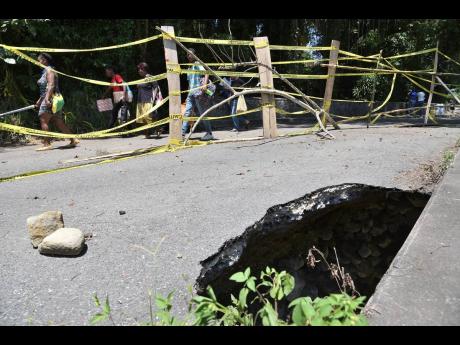Double the time, double the money - Caved-in St Mary bridge, longer travel burn commuters’ pockets
Residents of St Mary are reeling from the impact of hiked fares and back-breaking pressure carrying loads across a bridge that partially collapsed about a month ago.
Heaps of dirt and stone blocking vehicular traffic stand as symbols of the obstacle course that now redefines their lives.
The bridge connects the major communities of Richmond and Highgate and is in proximity to an old produce packaging plant.
Suzzette Young, a shopkeeper, said that transportation now costs her $600 – a 50 per cent increase – when she ventures out to purchase groceries to stock her shop.
“Plus, when mi come here suh, mi haffi pay dem an extra money depending on di load weh mi have. It really hard pan wi,” she said.
For Marjorie Whyte, it is an added inconvenience.
“At a time like this when we are fighting the virus, this is certainly not what we want, because there is more to spend in terms of sanitisation. For persons who have a little salary or no income, you can imagine how negatively this is impacting them,” Whyte explained.
A resident who did not want to be named believes that the added traffic volumes detouring on the bridge since repairs of the Junction Road began have helped compromise the structure’s integrity.
Ann-Marie Thompson lamented that it was difficult for her and others who are currently unemployed.
“To go around the alternative route is $300, and then it takes double the time,” Thompson lamented.
She said that should schools reopen before the bridge is repaired, “it will be tough”. Schools nationwide have been shuttered since March 13 to limit the spread of the new coronavirus.
“Timing is going to be a problem. Going to school going to be hard, and coming from school going to be harder,” she said, adding that on a regular basis, children return from school late.
Assistant general manager of Kong’s Auto Supplies, André Kong, bemoaned that the breakaway was affecting business drastically.
“A lot of our customers are complaining that they can’t come down here. It’s having a great impact on our business, especially where the garage is concerned,” he said.
Kong explained one of the ways his operation has been assisting customers.
“We tell them to call us when they get to the breakaway and we bring the parts to them, so it just costs them the same $100.”
Carl Whyte, a taxi operator, said that the major problem was that roads on alternative routes – Marlborough and Aleppo – are in a deplorable state.
“It cost more gas money to drive on those roads and less people are travelling because of the coronavirus,” he told The Gleaner, adding that he carries one less passenger per trip.
Another taxi operator who asked that his name be withheld said that he has been able to earn more since the closure.
“It good fi mi, but di people dem pocket a burn, ‘cause one round trip a $400, and some pay more ‘cause the Flinch River route is more expensive,” the taxi operator said.
When contacted yesterday, manager of communication and customer services at the National Works Agency, Stephen Shaw, said he was unable to provide an update at this time.

